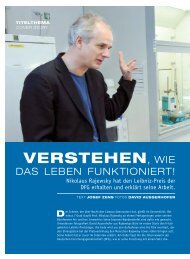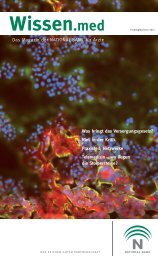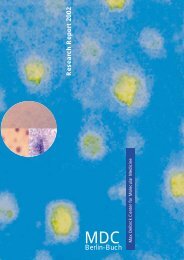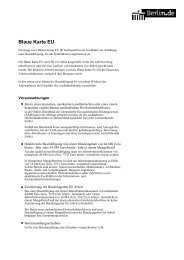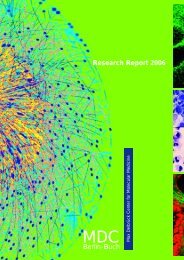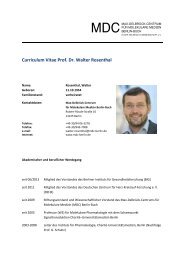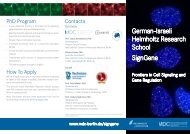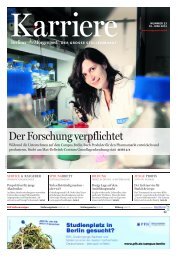Research Report 2010 - MDC
Research Report 2010 - MDC
Research Report 2010 - MDC
Create successful ePaper yourself
Turn your PDF publications into a flip-book with our unique Google optimized e-Paper software.
Structure of the GroupAntonio PezzuttoGroup LeaderProf. Dr. med. AntonioPezzuttoScientistsDr. med. Jörg WestermannDr. rer. Nat. Tam Nguyen-HoayDr. rer. Nat Oliver SchmetzerDr. rer. Medic Sonia WaicziesGraduate andundergraduate studentsGerd BaldenhoferNina SchmolkaAndreas WilhelmMona SalehTechnical AssistantsMargarete GriesNicole HellmigPeter TangMolecular ImmunotherapyGoal of our work is the implementation of basic research into preclinical models and clinicaltrials. Our strategies cover passive and active immunotherapy. We have recently concludeda pilot clinical study with a gene-modified tumor cell vaccine for treatment of advancedmetastatic renal cancer. A follow-up study by combining this vaccine with antibody therapy tomodulate regulatory T cells (T-regs) is in preparation in patients who responded to therapy withthyrosine kinase inhibitors such as sorafenib and sunitinib.Clinical vaccination studies using dendritic cellsor modified tumor cellsJörg Westermann and J. Kopp, in cooperation with Th.Blankenstein, W. Uckert and D. Schendel (GSF, Munich).In renal carcinoma (RCC), a gene-modified, tumor cellvaccine that expresses co-stimulatory molecules andsecretes Interleukin-7, generated in cooperation withTh. Blankenstein and W. Uckert (<strong>MDC</strong>) as well as D.Schendel (GSF, Munich) has been produced according toGMP rules in our laboratory at the Robert-Rössle Building.The pilot trial has been safely concluded. Based onour recent data concerning the numbers of regulatory Tcells in RCC patients undergoing therapy with the multikinaseinhibitors sorafenib and sunitinib we are planninga follow-up trial in conjunction with antibodiesthat increase T-cell stimulation by reducing regulatoryT-cells.In a recently concluded clinical vaccination trial using invitro-generated dendritic cells (DC) in patients withchronic myeloid leukemia (CML) we have seen reductionin the tumor load in 50% of the patients. A follow-upmulticenter national trial is starting in fall 2009 in CMLpatients with clinical but not molecular remission upontreatment with the tyrosine-kinase inhibitor imatinib.DNA Vaccination: preclinical modelsJörg Westermann, Tam Nguyeng Hoay and Sonia Waicziesin cooperation with U. Höpken and M. Lipp andPhysikalische Bundesanstalt, BerlinDNA vaccination offers several advantages over the useof peptides as vaccines (DNA covers several MHC-I andMHC-II epitopes, directly targets the endogenous presentationpathway and contains immunostimulatoryCpG sequences). In cooperation with the group of M.Lipp (Molecular Tumor Genetics) we have explored thepossibility of recruiting immune cells at the vaccine siteby inserting DNA sequences coding for the chemokinesCCL19 and CCL21 as possible adjuvants. Coexpression ofCCL19 with tumor antigens results in enhancement of aTh1-polarized immune response with substantialimprovement of the protective effect of the vaccine.Further improvement of the vaccine potency has beenachieved using a novel gene-gun for vaccine application(Cooperation with the Robert-Koch Institute). We haveset up a preclinical model using the human breast-cancerassociated antigen Her-2 as a target antigen toexplore the potential use of a vaccine for breast cancerpatients. S. Vaiczies is exploring magnetic resonanceimaging to study dendritic cell migration in vivo.Immunity against EpCam (Epithelial Celladhesion molecule) / CD3 kappa as animmunomodulatory polypeptideOliver Schmetzer in cooperation with P. Schlag andG. Moldenhauer (DKFZ)Heteroclitic peptides derived from the Epithelial AdhesionMolecule EpCam appear able to induce a strong T-cell stimulation by upregulating the TCR. A splice vari-130 Cancer <strong>Research</strong>



